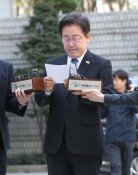Did the president have to attend a signature-seeking campaign?
Did the president have to attend a signature-seeking campaign?
Posted January. 19, 2016 07:31,
Updated January. 19, 2016 13:39
January 17 will go down in Koreas constitutional history. President Park Geun-hye participated in a signature gathering campaign on that day to urge lawmakers to pass the bills pending in the national assembly that are designed to support the livelihood of middle-class families. After attending an event held at a square in Pangyo, President Park contributed her signature to the cause and urged the citizens to follow suit. You will understand the profound frustration and desperateness that made them hold a signature-seeking event. That is why I am here to make my share of contribution, she said at the event.
As the head of the administration, president is allowed to propose a bill, which effectively makes him or her a legislator. It is unprecedented for any president to attend a signature-gathering campaign to demand passing of legislation. "Legislation movement" used to belong only to the opposition parties or civic groups like the signature campaign in 1986 to realize constitutional revision for direct election system. In fact, President Park hinted at a potential public movement during the new years press conference. When asked of how she will handle the stranded bills on economic revitalization and labor reforms, she replied that there was not much that the president or her administration can do about the situation any more, saying, Now, our citizens have to step up.
Seeing a head of state urging the people outside the presidential office, however, is both frustrating and uncomfortable. Most people know the current state has been caused mainly by the parliamentary advancement act. It is also well known that the opposition camps have primary responsibility for this as they wont sign the bills on labor reforms and economic revitalization. Back in 2012, however, it was President Park who spearheaded the effort to pass the parliamentary advancement bill when she was serving as head of the emergency planning committee of the Saenuri Party. Before passing the buck to the opposition parties blindly, the president will have to admit to the root cause of the problem and take time for self-reflection. It would be more desirable if she invited the head of the oppositions and the speak of the house to her office, nay, if she visited them in person and persuaded them, instead of going to the streets and taking part in a signature-gathering event.
On Sunday, the ruling Saenuri Party held a steering committee and scraped the revised act on parliamentary advancement, which had already been submitted. There was a reason why the ruling party, which initially proposed the bill, took such a measure. In fact, it was a scheme to exploit Article 87 of the National Assembly law. It stipulates that any bill that was scraped by the standing committee may be referred to the general meeting directly on the condition that the request be filed within seven days by 30 people or more, which was heavily frowned upon National Assembly Speaker Chung Ui-hwa. During the press conference on Sunday, Saenuri Party Chairman Kim Moo-sung said that he strongly asked for granting the authority to the speaker to propose the revised bill directly to the general meeting. It is almost impossible to choose a lesser of the two evils between the ruling partys trickery and its chairmans comment. While it is true that the opposition parties are interrupting legislation by holding hostage the parliamentary advancement bill, the president, the ruling party, and its chairman are even more frustrating people.







